25 Best Foods to Eat for Muscle Definition and Toning
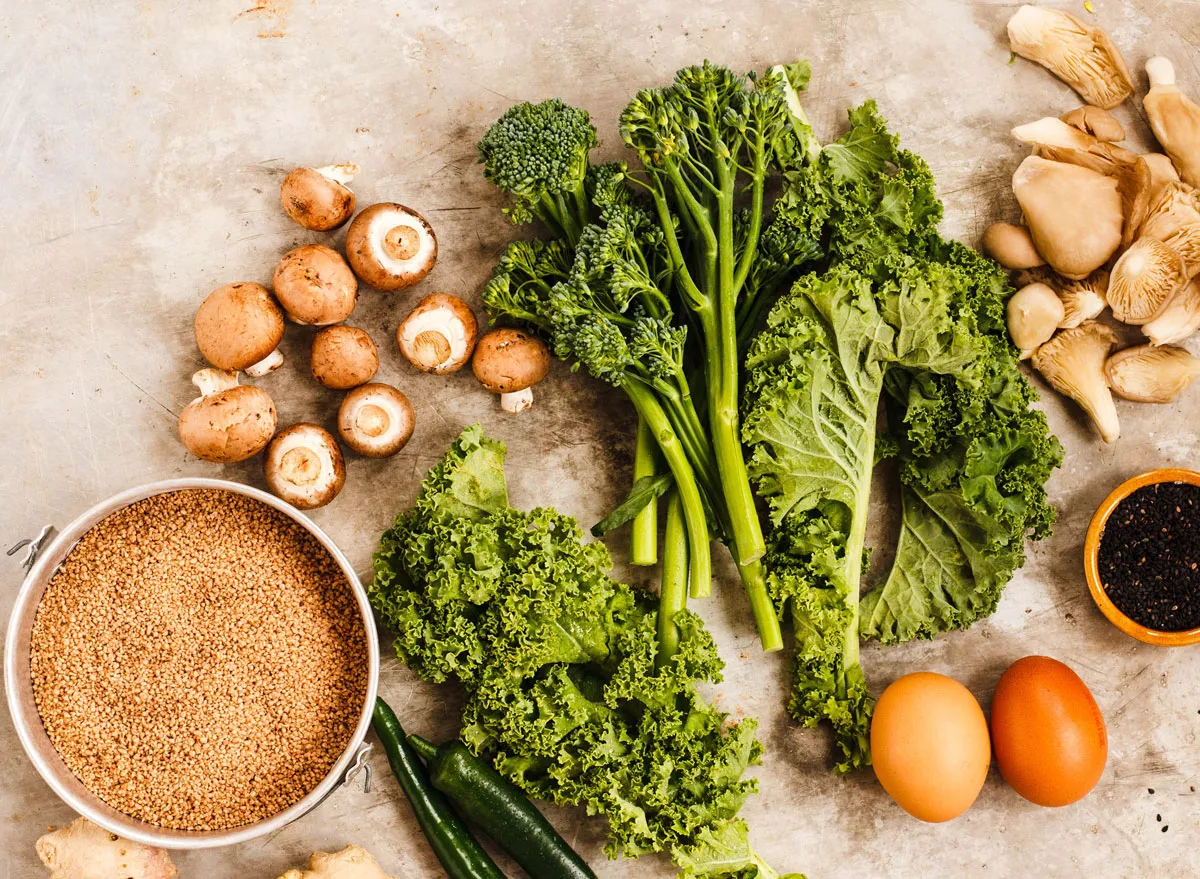
Pumping iron is important for muscle growth, but so is getting enough of the mineral itself. And it’s not just iron we’re talking about. If you want to look fit and toned, your food game has to be as strong as your gym game. That involves eating a diet rich in the following muscle-building foods.
Introducing more nutrient-dense foods into your diet will not only help your muscles grow more defined, but it can also assist rapid weight loss efforts, which will help reveal a more toned you overall.
How exactly do these foods help with muscle definition and toning? They all contain specific micro and macronutrients that are scientifically proven to:
- accelerate muscular tissue growth
- lower levels of stress hormones that promote fat storage
- increase blood flow to your muscles (which increases their efficiency and the rate at which they repair themselves, so they can then grow bigger)
- lower inflammation that can inhibit muscle breakdown
- facilitate energy metabolism
So grab a dumbbell in one hand and a shopping cart in the other, and let’s get to it—here are the 25 best foods for a toned body.
Kale
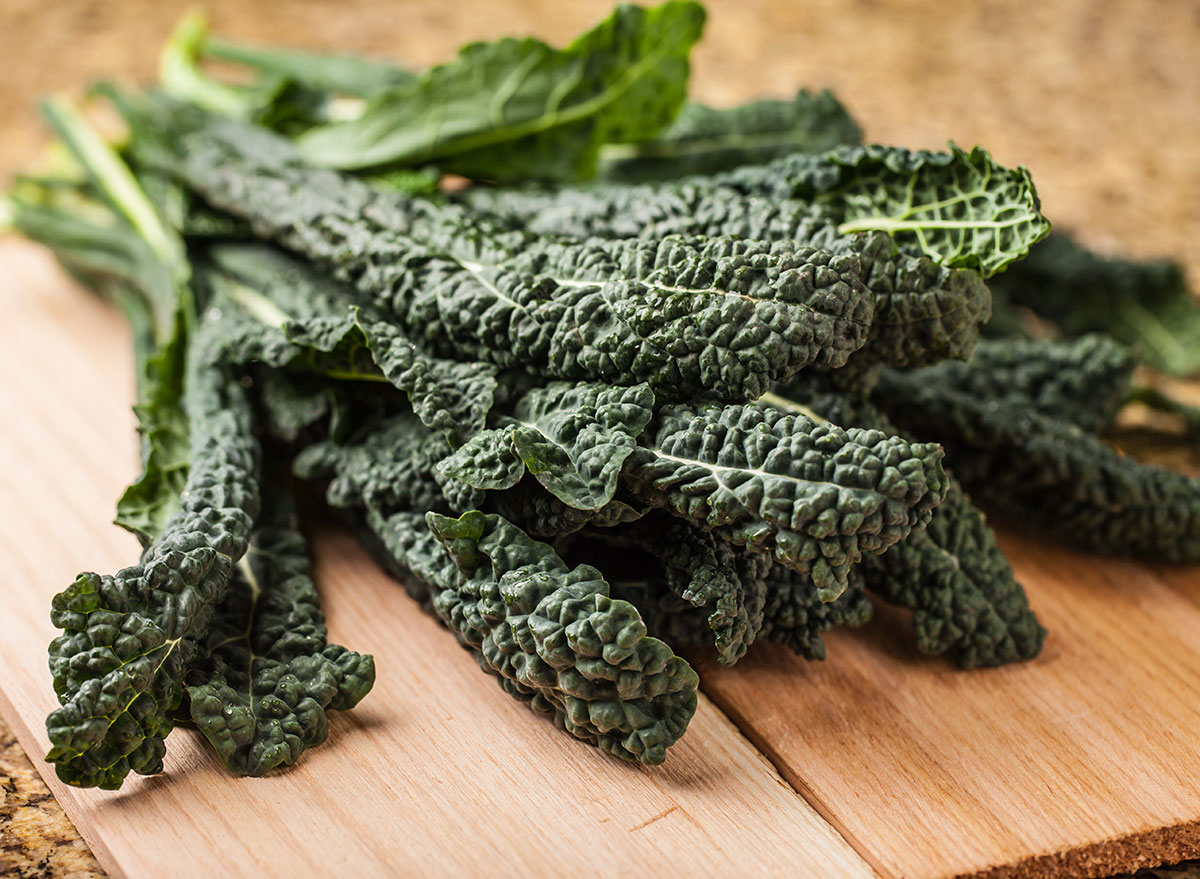
Popeye may have built bulging biceps on spinach, but kale is king when it comes to weight loss foods that help muscles grow. Although the classic salad green boasts protein, kale packs an impressive amount of iron, a mineral vital for muscle development. Iron helps your body circulate oxygen to your muscles, aids in their repair after heavy training and encourages synthesis of the muscle fibers that gives them that defined look you crave. Kale is also key to seeing noticeable changes in your muscle definition, because its iron content also boosts your endurance, allowing you to lengthen and intensify your gym sessions. As if that weren’t enough reason to love this leafy green, it’s also rich in vitamin K, which keeps you feeling good through your rigorous lifting routines by fighting inflammation and protecting against stiff joints.
How to Best Eat It: Use kale as a salad base or—if you’re adventurous—try these Vrill cubes.
Millet
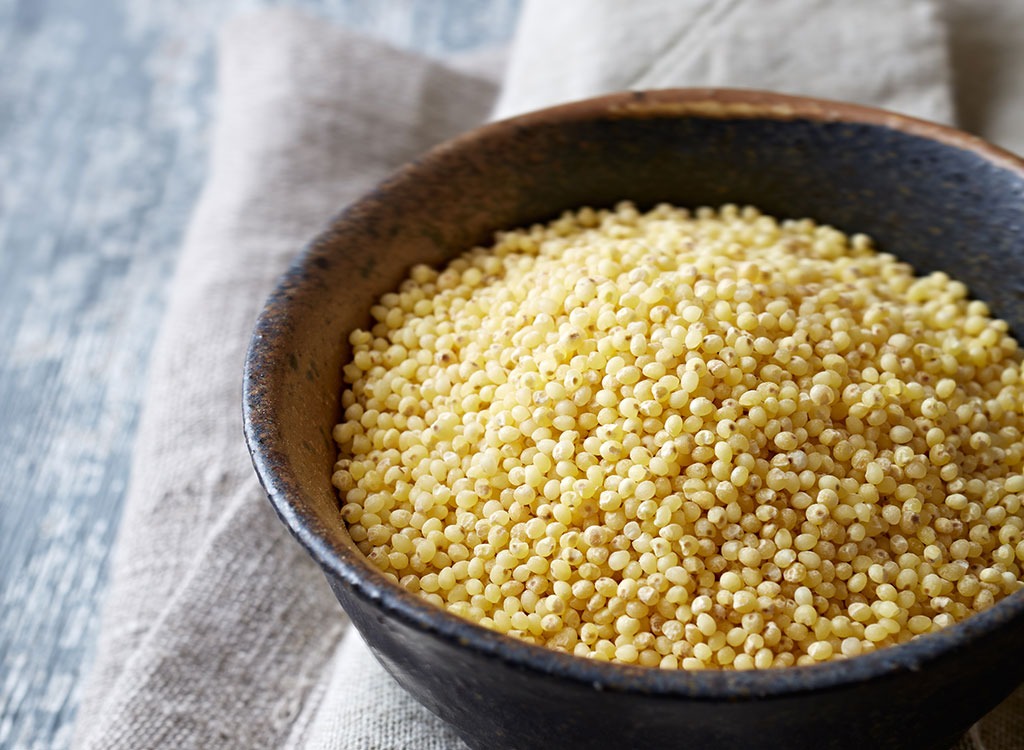
Millet may be the main ingredient in birdseed, but this lesser-known health food shouldn’t be limited to Mr. Bluebird on your shoulder. Although technically a seed, millet should be treated as a grain. Very similar to the ever-popular quinoa, it helps enhance blood flow to your muscles thanks to its rich magnesium content, allowing them to develop and take on a more toned look. Even better, this seed has the power to strengthen your body and give your muscles long-lasting fuel because it’s a great source of plant-based protein and complex carbohydrates.
How to Best Eat It: Use it just as you would quinoa—in salads, sides and breakfast bowls. Quinoa and millet can be interchanged. If you’re lucky, you may be able to find millet bread in the frozen section of certain grocery stores.
Hemp Seeds
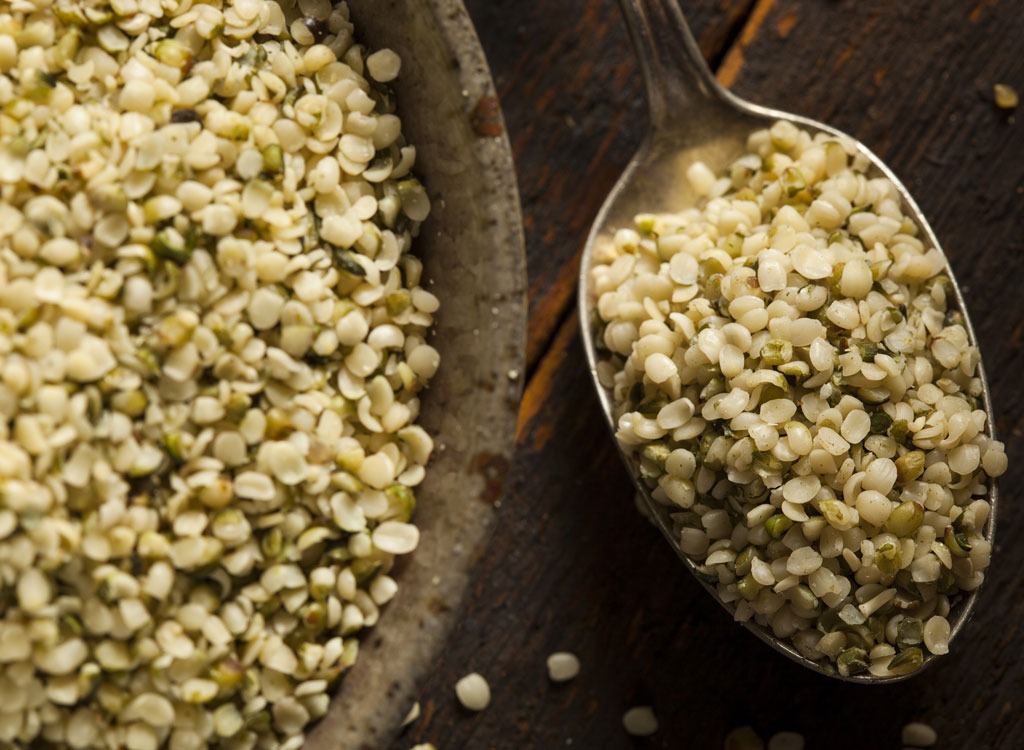
Yes, hemp seeds come from the cannabis plant, but sorry, Woody Harrelson: They will not get you high. Sometimes called hemp hearts, the seeds are rich in amino acids, which your muscles drink in to gain power and tone up. Just three tablespoons offer up 11 grams of easy-to-digest, muscle-toning protein. What’s more—hemp may also boost fat burn thanks to its gamma-linolenic acid (GLA) content, an omega-6 fatty acid that encourages a healthy metabolism and fights inflammation in the body. And they also encourage more vibrant skin, hair and nails, qualifying them as an overall beauty food.
How to Best Eat ThemSprinkle hemp seeds whole on salads, or blend some hemp powder into the best weight-loss smoothie ever.
Chia Seeds

If there’s only one thing Rudy taught us, it’s that the power of something shouldn’t be underestimated because of its diminutive size. They may be tiny, but chia seeds have massive health benefits and plenty of muscle-chiseling power. Their greatest strength as a better-body ally comes from the one-two punch they deliver of omega-3 fatty acids and fiber. Healthy omega-3s work to reduce inflammation and help strengthen and grow your muscles through the process of protein synthesis, while fiber (and protein) supply you with steady, long-burning energy. In fact, just two tablespoons of the seeds contain 11 grams of gut-filling fiber.
How to Best Eat Them: The secret to these little guys is that they swell ten to fifteen times their original size when added to liquid, forming a gel-like substance, which keeps you feeling fuller longer. Sprinkle these potent seeds over cereal, stir-frys, and yogurt, or mix into breakfast smoothies or baked goods for the full effect.
Quinoa
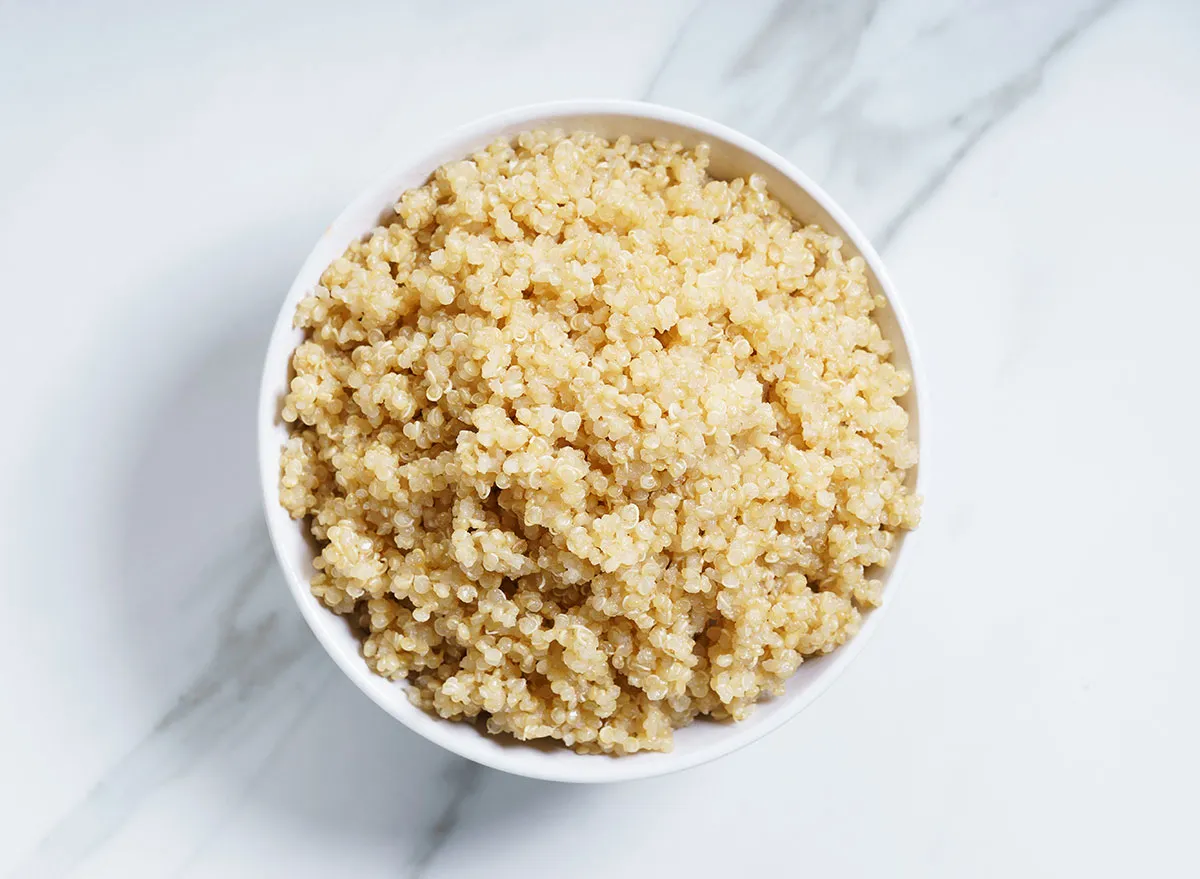
A particularly grueling workout can feel like going a round in the boxing ring against a heavyweight champ, but quinoa is your ropes. Rely on this complete protein to help you rebound faster and come back stronger thanks to its slow-burning complex carbs, notable protein content and rich levels of lysine, an amino acid that aids tissue and muscle repair. What’s more, quinoa is a rich source of minerals including magnesium, which helps relax the blood vessels and improve blood circulation to your muscles. All that adds up to a noticeably more defined, stronger you.
How to Best Eat It: You’ll be bikini-body ready in no time by cooking up these quinoa recipes for weight loss.
Cottage Cheese with Live Cultures
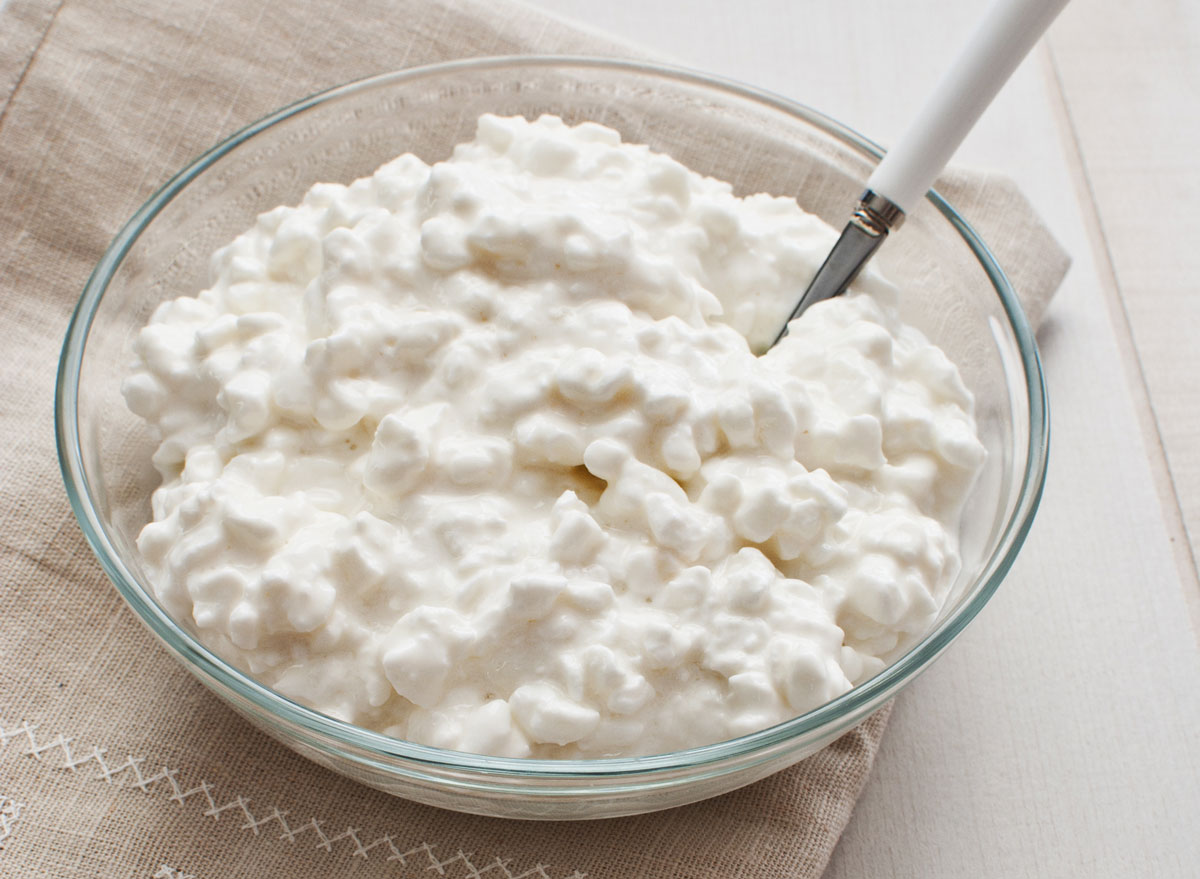
Cottage cheese’s muscle-building powers come from two different components: casein (the slow-digesting dairy protein) and live cultures. When you eat casein, your blood amino acid levels rise slowly and stay elevated for longer than if you would have eaten whey (the other dairy protein). The live cultures will help you break down and absorb all the nutrients you need to get bigger and stronger.
How to Best Eat It: Pair it with some fruit and eat it with a spoon, or use it to make a protein pancake.
Spinach
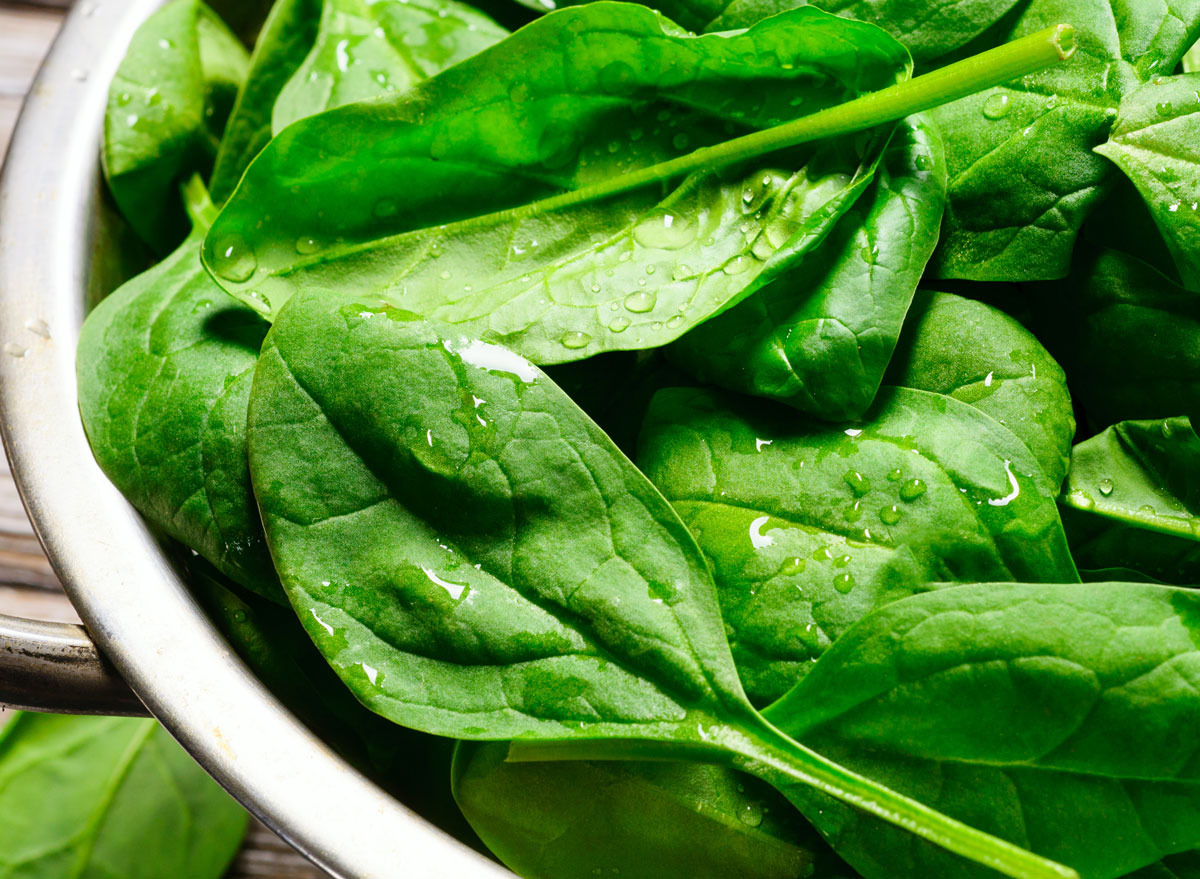
As we noted before, downing iron is as important as lifting it — the mineral is crucial to building muscle and strength, and spinach is the dietary MVP. According to the United States Department of Agriculture, a 180-gram serving of boiled spinach has 6.43 mg of iron — more than a six-ounce piece of hamburger. The leafy green is also an excellent source of magnesium, a mineral that’s essential to muscle development, energy production, and carb metabolism. Two studies have found that levels of testosterone (and muscle strength) are directly correlated to the levels of magnesium in the body. Other good veggie sources of magnesium: Radishes, soybeans and chard.
How to Best Eat It: Lose weight and tone up with our Quick Spinach-Pomegranate Salad With Roasted Turkey Recipe.
Lentils
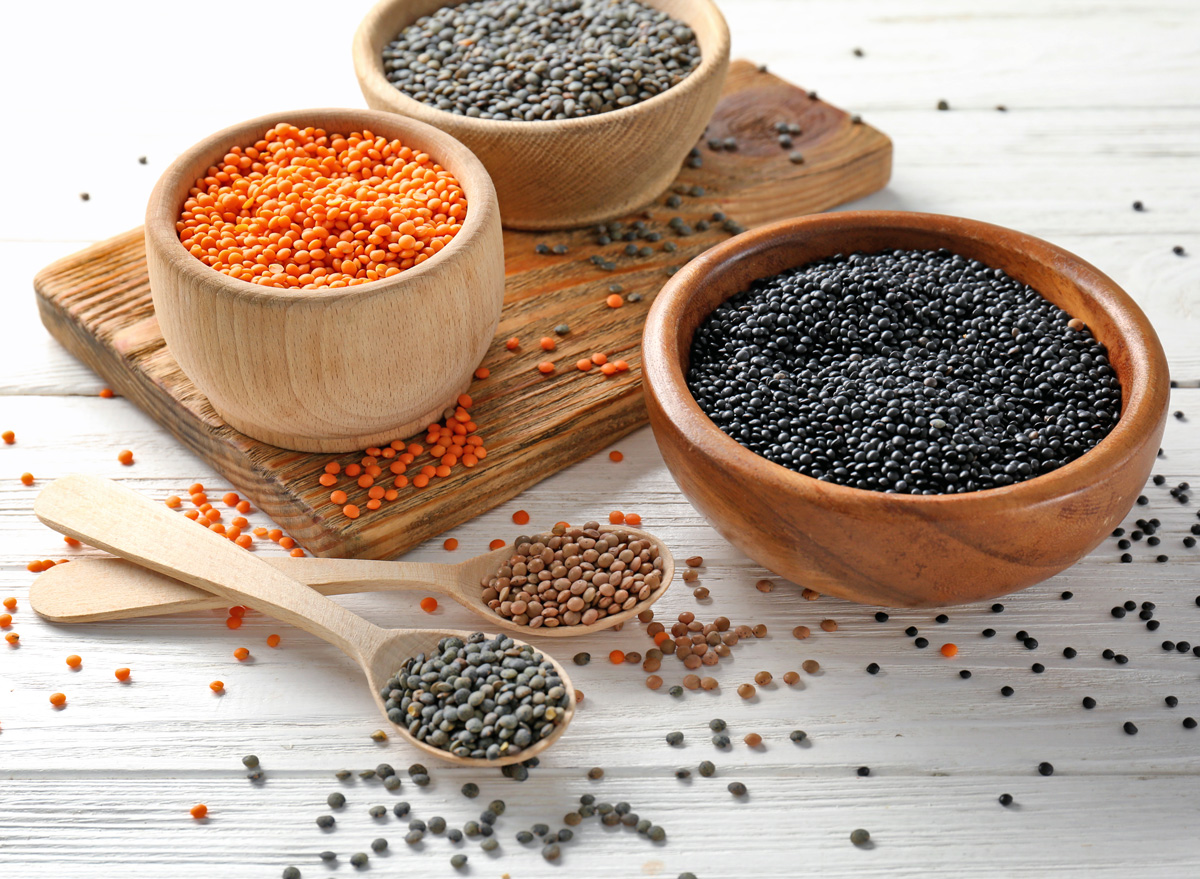
Lentils may be one of the most underrated muscle-building weapons. One cup of the cooked variety contains 18 grams of protein and 40 grams of slow-digesting quality carbohydrates. They’re also very inexpensive, have a long shelf-life and cook up in just 10 minutes
How to Best Eat It: Mix them with brown rice, sprinkle them over a salad or eat them as a standalone side dish.
Wild Salmon
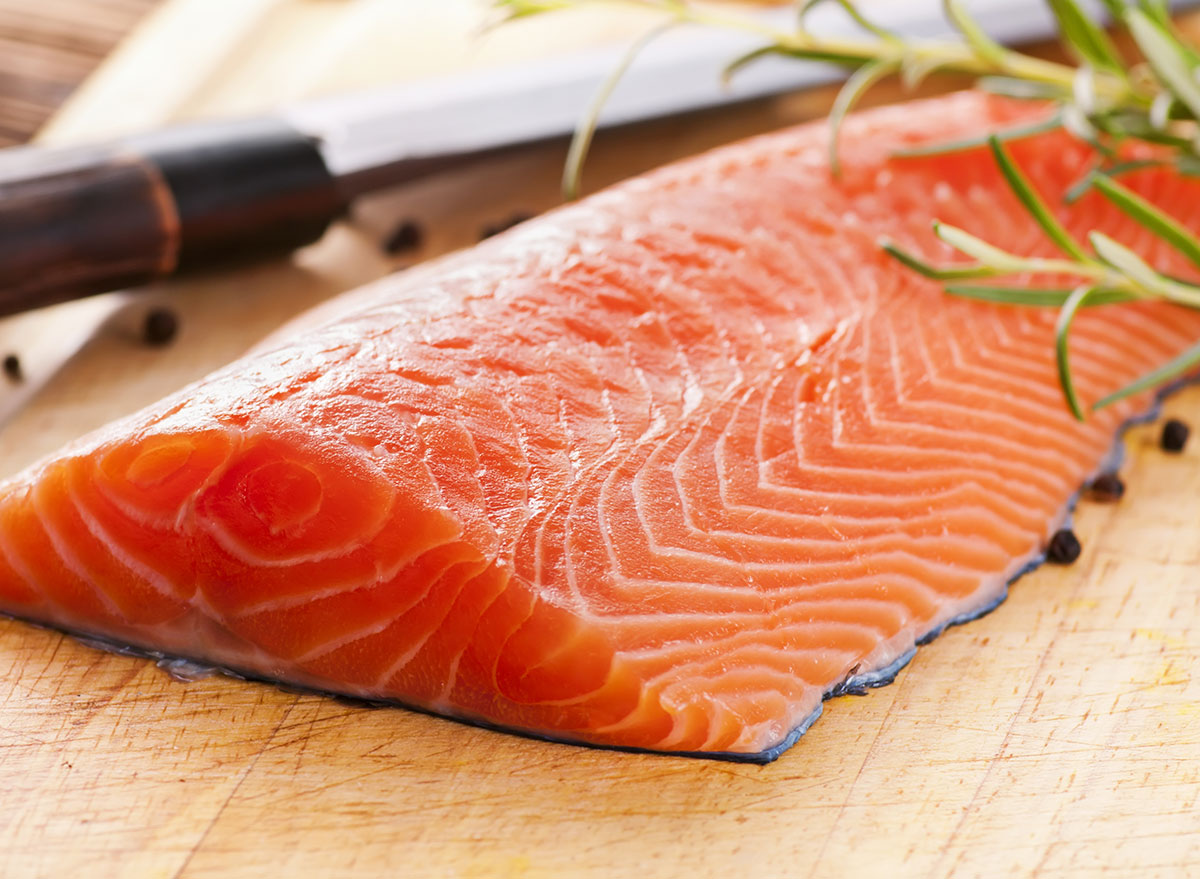
Salmon contains both high-quality protein and long-chain omega-3 fats EPA and DHA. These omega-3 fats are most well known for their ability to improve heart health, but they also inhibit muscle breakdown while increasing the anabolic capacity of amino acids. If you don’t like eating fish, then make sure to take a fish oil supplement to reap these benefits. And, just because your fish is fatty doesn’t mean your body will be, too.
How to Best Eat It: Whip up one of these salmon recipes for weight loss!
Sweet Potatoes
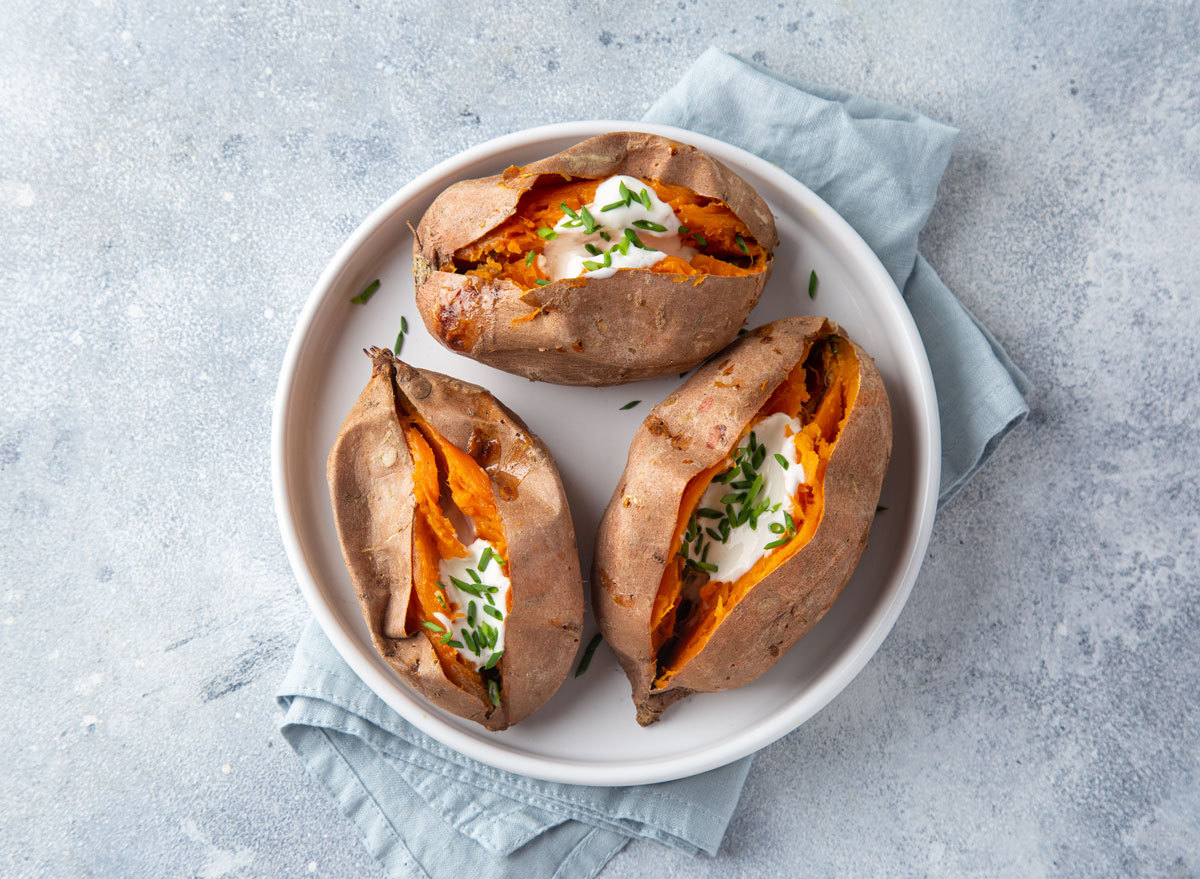
There’s a reason bodybuilders scarf these with their chicken breasts: They’re one of the cleanest sources of fuel available. High in fiber and carbs (4 grams and 27 grams per serving respectively), the vibrant tubers have a low-glycemic index, meaning they burn slowly, providing a long-term source of energy that helps you power up after a workout and recover your stores of muscle glycogen afterward. The fiber keeps you fuller longer, helping prevent the overeating that’ll shatter your dreams of getting shredded and toned. Bonus: One cup of sweet potato cubes has four times your RDA of vitamin A, which helps your body synthesize protein.
How to Best Eat It: Bake an orange tater in the oven and sprinkle it with some paprika and ground black pepper.
Broccoli
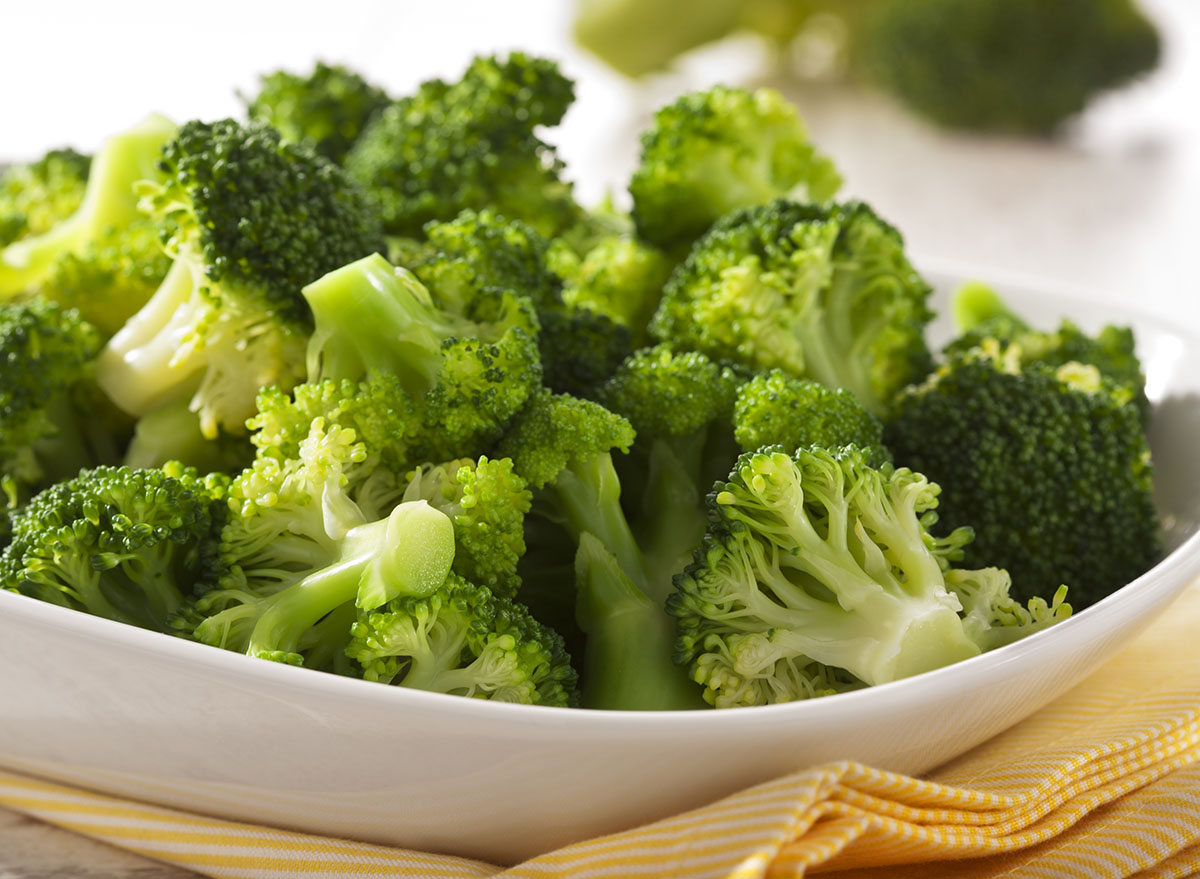
There’s a reason almost every muscle-building diet includes a hefty dose of broccoli. The green superfood is rich in sulforaphane, a compound that not only increases testosterone and fights off body fat storage, but also blocks enzymes linked to joint destruction and inflammation. And if you want to stay lean and active for life, maintaining healthy joints is a must! Bonus: The green veggies is also rich in vitamin C (a mere cup of the stuff can help you hit your daily mark), a nutrient that can lower levels of the stress hormone cortisol, which will further aid your toned body efforts.
How to Best Eat It: Whip up our Easy Crock-Pot Beef and Broccoli Recipe to reap the belly-flattening benefits—just not the day before you need to look your leanest.
Avocado
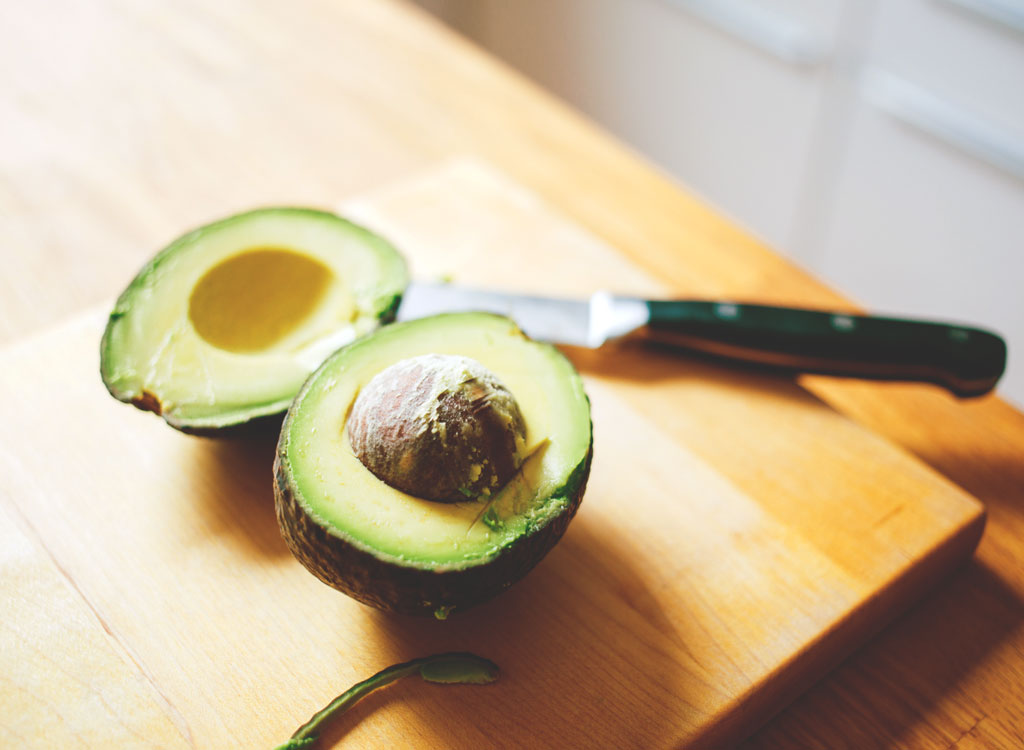
As reigning king of the fats that help fight fat, avocado is a rich source of potassium, in addition to healthy monounsaturated and oleic fatty acids, which may actually help spot-reduce belly fat. What’s more, the fiber-rich guac-and-roller also boosts the healthful properties of other fresh veggies when paired together. Research shows that by adding healthy fats like avocado to produce-rich dishes like salad, you can boost your body’s absorption of the nutrients available.
How to Best Eat It: Add some slices of the stuff to your salad or sandwich. Alternatively, try one of these avocado recipes for weight loss.
Berries
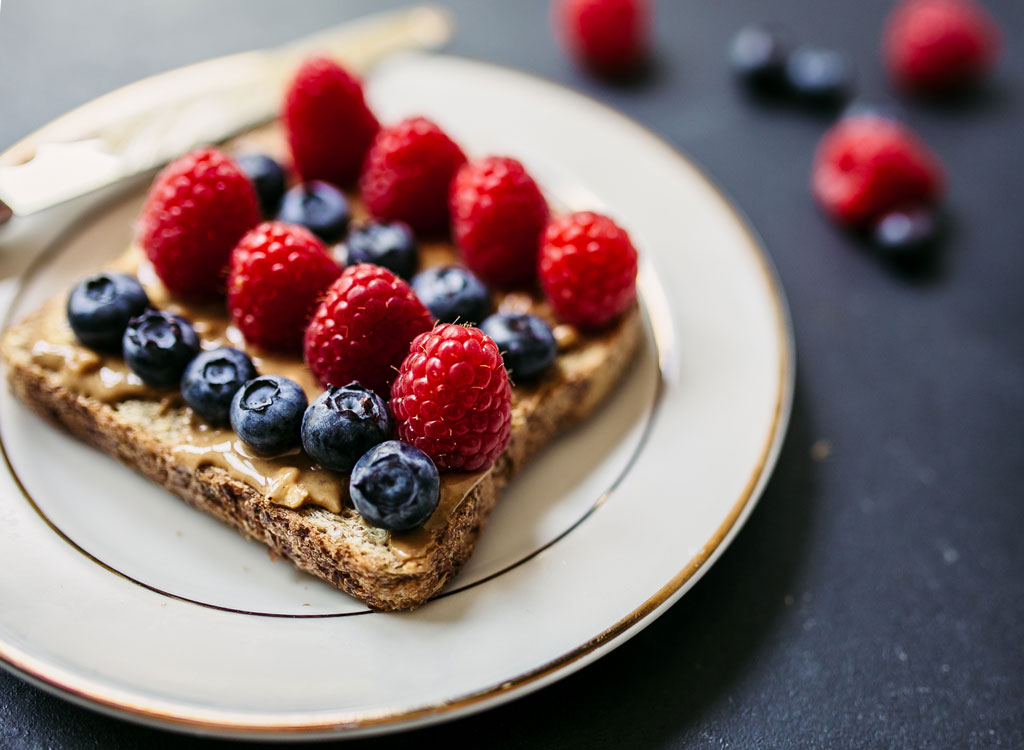
If you want to stay active and muscular for lift, keeping painful inflammation at bay is a must. Berries contain anthocyanins and ellagic acid, antioxidant compounds that ward off inflammation and joint pain. But that’s not their only benefit. Berries have also been shown to decrease the formation of fat cells, so noshing on them is a win-win!
How to Best Eat It: Add berries to hot or cold cereal, smoothies, Greek yogurt or overnight oats.
Organic Soybeans
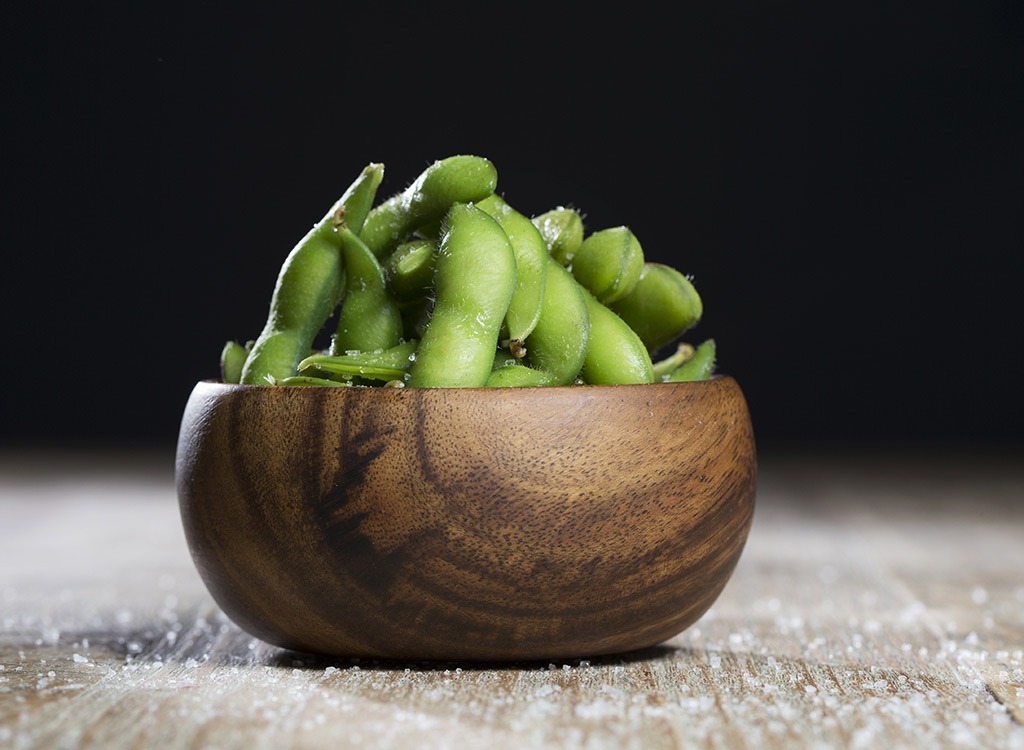
Whether you consume them as tofu or edamame, organic soybeans should be in your veggie rotation if you’re serious about building muscle. And that’s not just because of their hefty protein content (one cup of tofu has 52 grams) that has made them vegetarians’ go-to meat substitute. According to the USDA, soybeans are the vegetable that’s highest in leucine, an amino acid that stimulates protein synthesis. Read: They not only bring the muscle-building stuff but also speed it to the muscles you want to build.
How to Best Eat It: Eat roasted soybeans solo as an on-the-go snack, or add them to homemade trail mixes. Slice and pan-fry tempeh (a traditional Indonesian fermented soy product) and use it in lieu of meat on a sandwich, order edamame (steamed soybeans) as an appetizer next time you’re at a Japanese restaurant, or add soymilk to overnight oats.
Mushrooms

One variety of this veggie is the #1 vegetable source of vitamin D, which researchers have begun to find may play a role in muscle building. In a recent study published in the journal Medicine & Science in Sports & Exercise, researchers measured the leg and arm strength of 419 men and women and tested their vitamin D levels; they found that participants with higher levels of D were stronger. A separate analysis of 30 studies involving 5,615 people found that D supplementation was positively associated with muscle strength. The best mushroom to buy is maitake, a.k.a. Hen of the Woods. One cup provides three times your daily allowance of D! Other varieties that are D-rich: Chanterelle, morel and shiitake.
How to Best Eat It: Sautée mushrooms in a skillet with fresh lemon, soy sauce, olive oil, and chopped garlic until golden brown. Serve with your protein and whole grain of choice for a complete, nutritious meal. Throw the leftovers in salads or omelets.
Beets
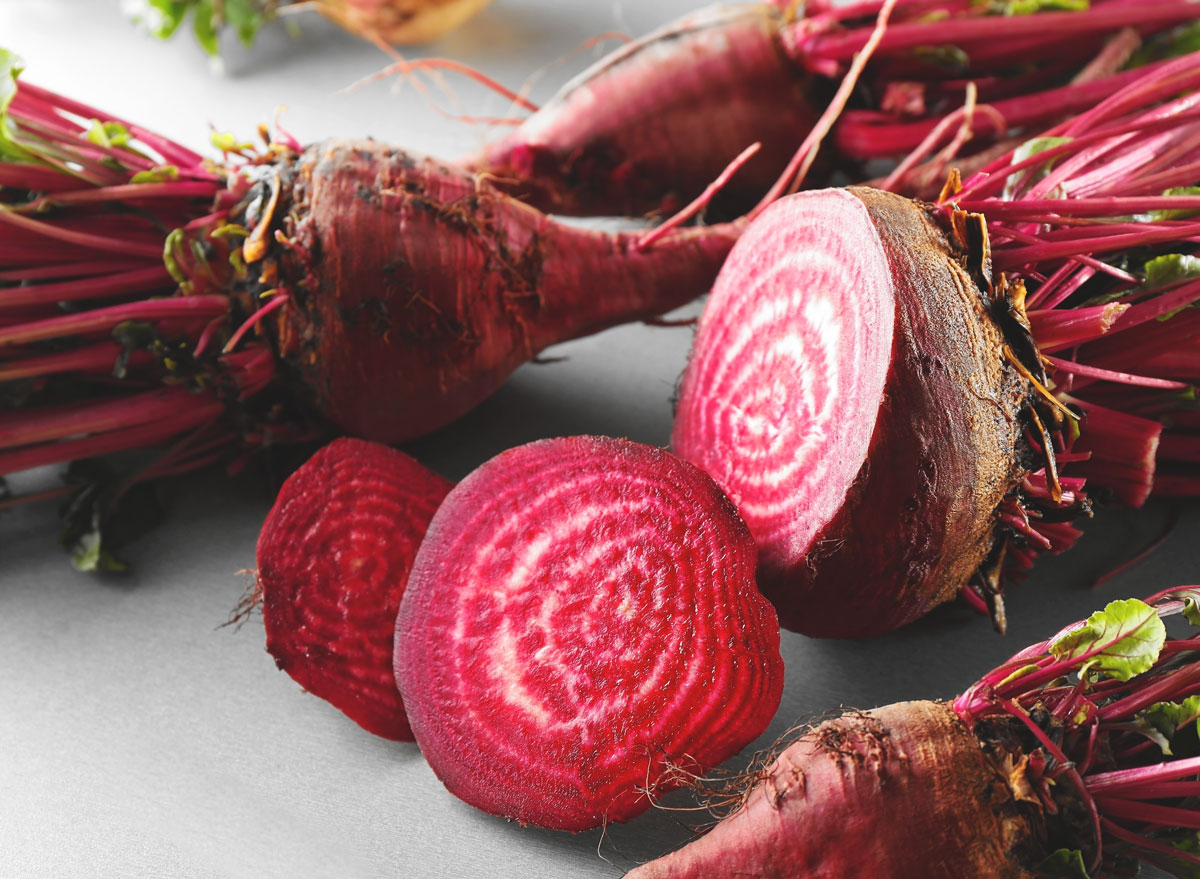
They’re underground and underdogs—the veggie often least bought. But beets are low in calories, high in fiber and rich in iron, a mineral that aids proper muscle function and efficiency by boosting blood flow.
How to Best Eat It: Trim both ends of the beet, toss in a small amount of olive oil and roast at 450 degrees Fahrenheit until tender. Then slice and pair them with some mint and goat cheese as a small salad, or as a side to a lean meat dish.
Greek Yogurt
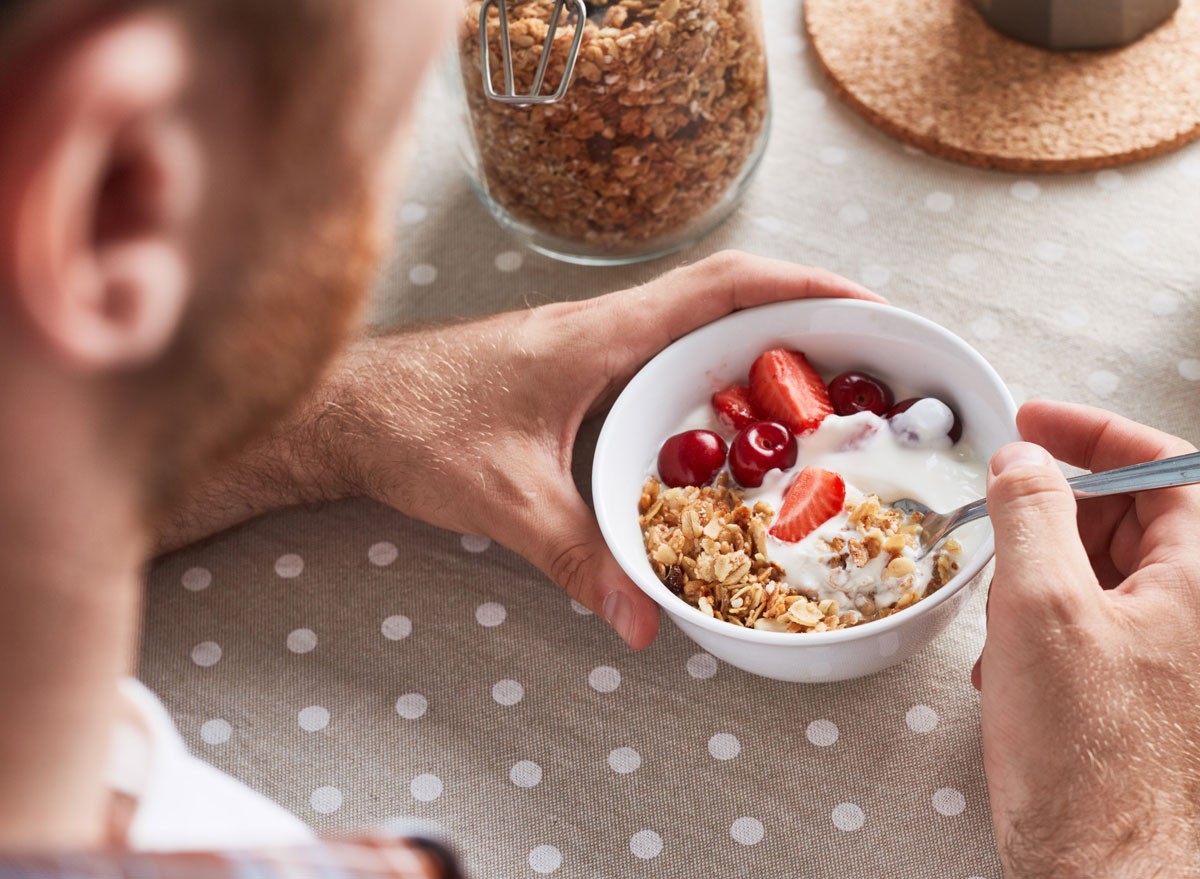
Packed with muscle-nourishing nutrients, Greek yogurt is the ideal workout partner. “It’s a good source of protein, calcium and vitamin D, which are good for muscles,” says Ilyse Schapiro, MS, RD, CDN, a registered dietitian with practices in New York and Connecticut. “Vitamin D is definitely important for your bones—you need strong and healthy bones to sustain muscles—and it impacts protein synthesis. People with low vitamin D levels have been shown to have decreased strength and greater muscle wasting.” Skip the varieties with added fruit; they have too much sugar. Go for the plain, full-fat variety (it’s higher in nutrients than skim).
How to Best Eat It: Use our guide to finding a healthy yogurt to make sure you’re getting the best tub for your body.
Watermelon
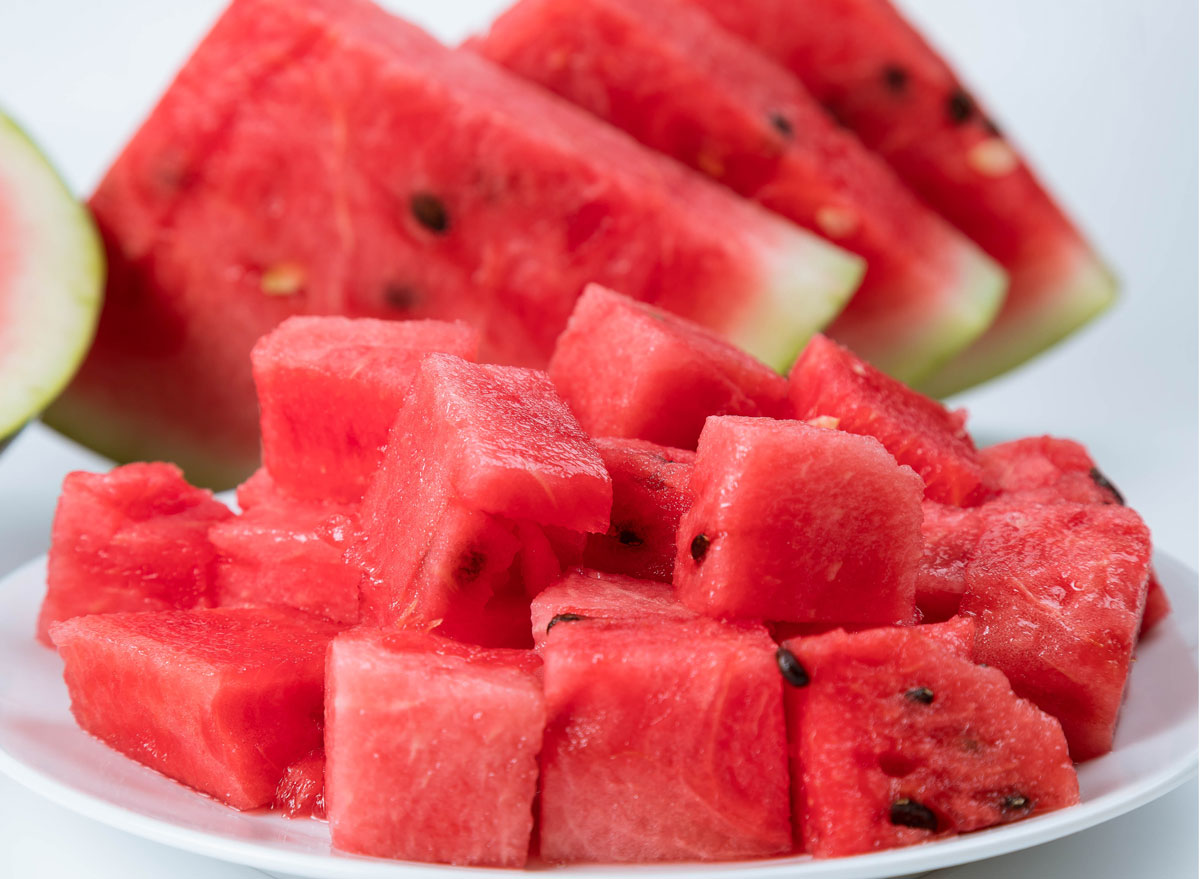
The red-hued fruit can really help you get the lean, muscular look you crave. In fact, research suggests that eating watermelon improves lipid profiles and lowers fat accumulation, thanks to the fruit’s high concentration of anthocyanin, a compound that calms the action of fat-storage genes and gives watermelon its signature hue. It gets better: Watermelon can also help reduce the level of muscle soreness after a tough workout. The faster you’re able to get your butt back in the gym, the sooner you’ll get the body you’ve always wanted—it’s as simple as that.
How to Best Eat It: Add chunks to a fruit salad, blend some fruit with some ice to create a homemade watermelon drink.
Grapefruit
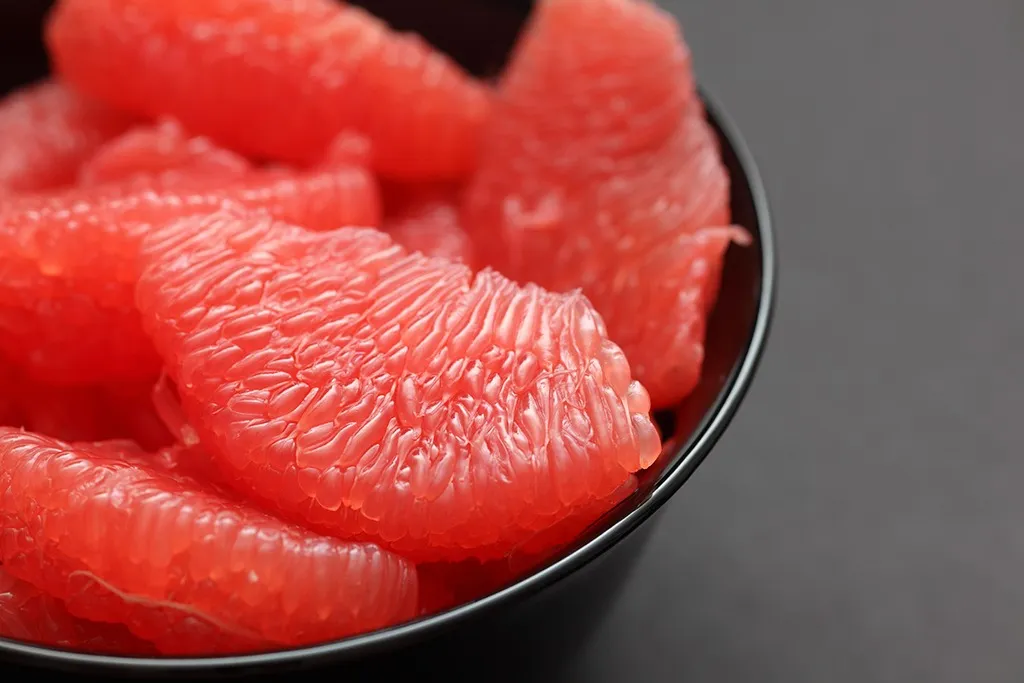
Your body cannot efficiently change carbs into energy without ample water. And, according to the Journal Physiology of Sport and Exercise, you can’t deliver essential amino acids to muscle tissue without adequate water, either. Not only will your workout sessions suffer, but insufficient liquids in your body will also hinder fat breakdown. Don’t wait until you’re thirsty — thirst signals the first stage of dehydration, which means you’re already too late. Drink often throughout the day and eat hydrating foods like grapefruit, which is 90% water. University of Arizona researchers suggest that just half a grapefruit eaten before a meal can help reduce belly fat. Participants of the six-week study who ate grapefruit with every meal saw their waists shrink by up to an inch!
How to Best Eat It: Throw wedges of the juicy fruit into the freezer for up to four hours and enjoy noshing on them as a light aperitif.
Beans
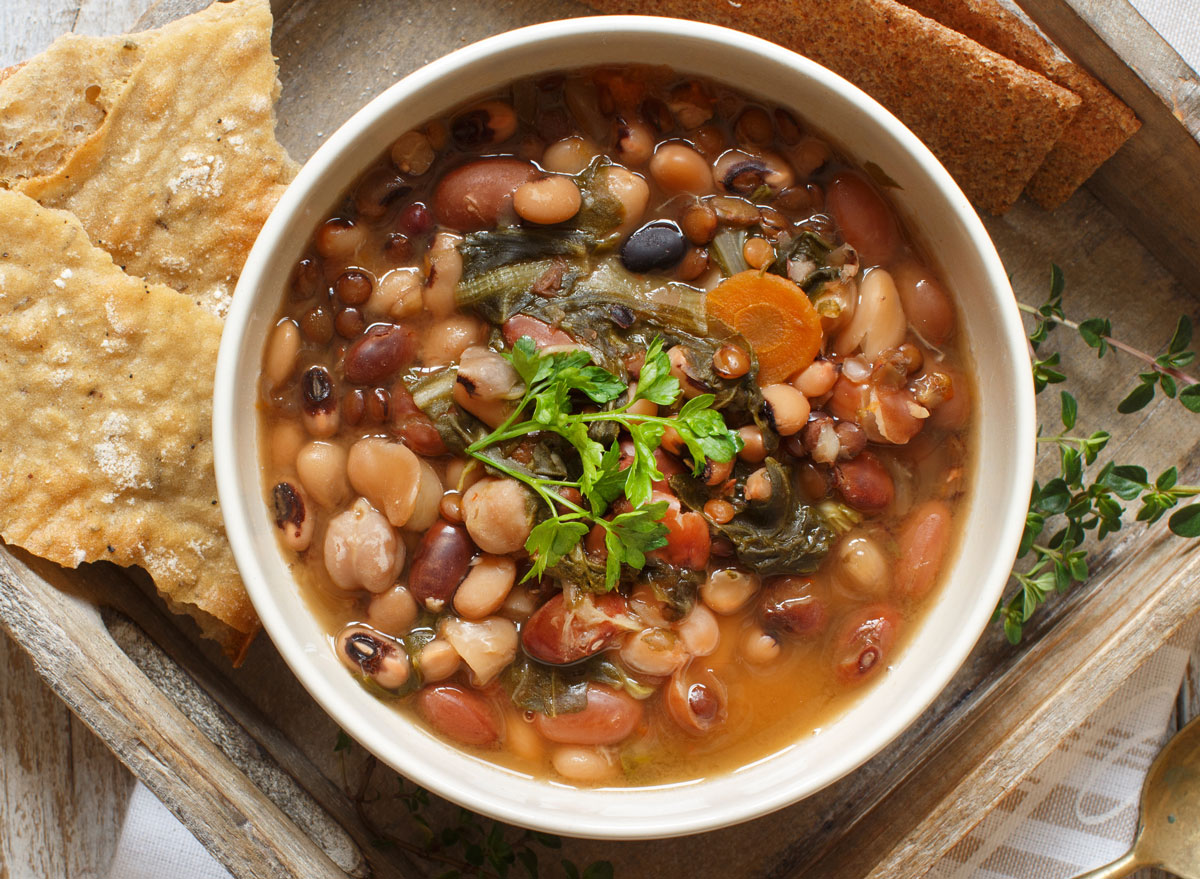
The simple bean is actually an advanced fat-burning, muscle-building machine. “Beans are a great source of protein that includes fiber,” says Leah Kaufman, MS, RD, CDN, CDE, a New York City-based registered dietitian. “That’s going to ensure your blood sugar doesn’t spike and will give you energy to build the muscle you want.” One cup of black beans has 12 grams of protein and 9 grams of fiber; they’re also rich in folate, a B vitamin that stokes muscle growth, and copper, which strengthens tendons. On top of that, a study showed that consuming just three-quarters of a cup of beans or legumes daily accelerates weight loss.
How to Best Eat It: Add beans to soups and salads or use them to make brownies. Yes, brownies! Blend 15 ounces of black beans and 1 cup of water together in a blender. Combine with a package of organic brownie mix and combine until smooth. Bake in a greased baking dish for 25 minutes on 350 degrees F. The result? The most dense, chewy treats you’ve ever tried!
Olive Oil
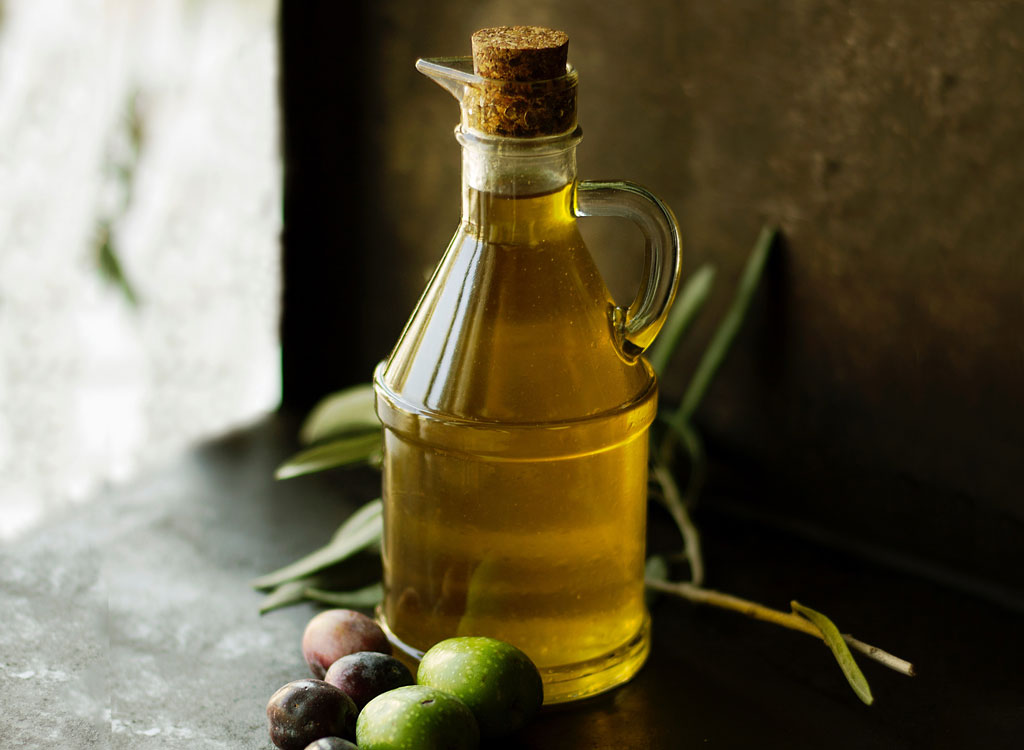
Extra virgin olive oil may increase blood levels of serotonin, a hormone associated with satiety. The more satiated you feel, the fewer calories you’re apt to consume which will help you achieve the lean physique of your dreams.
How to Best Eat It: Use olive oil to whip up a salad dressing, use it in place of Pam to grease your cooking pans, or use it sautée up some veggies—it’s super versatile.
Papaya
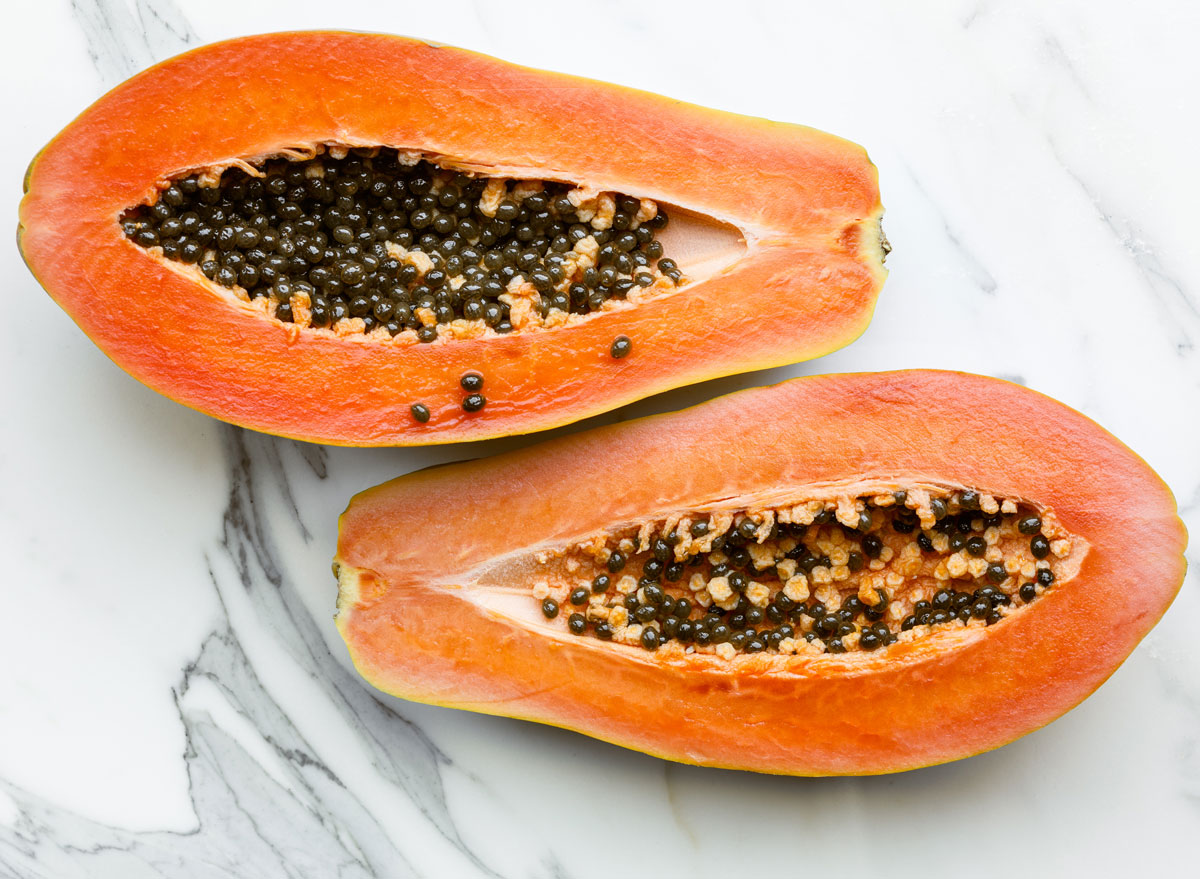
Even if you eat well and exercise, constantly pulling your hair out can prevent your abs from showing. When we stress out, the body starts pumping out the hormone cortisol, which encourages the body to store cholesterol-raising fat around the midsection. The good news is that vitamin C-rich foods like papaya (1 cup, 146% DV) and red bell peppers (1 cup, 316% DV) can help keep you trim. According to researchers, the nutrient can lower levels of cortisol during stressful situations, helping those toned, sexy abs take center stage.
How to Best Eat It: Add papaya to your daily fruit salad or smoothie. Peppers, on the other hand, make a great addition to eggs. Chop some up, add them to a hot pan with some olive oil, add in two or three eggs and scramble them up to stay toned and slim.
Grass-Fed Beef
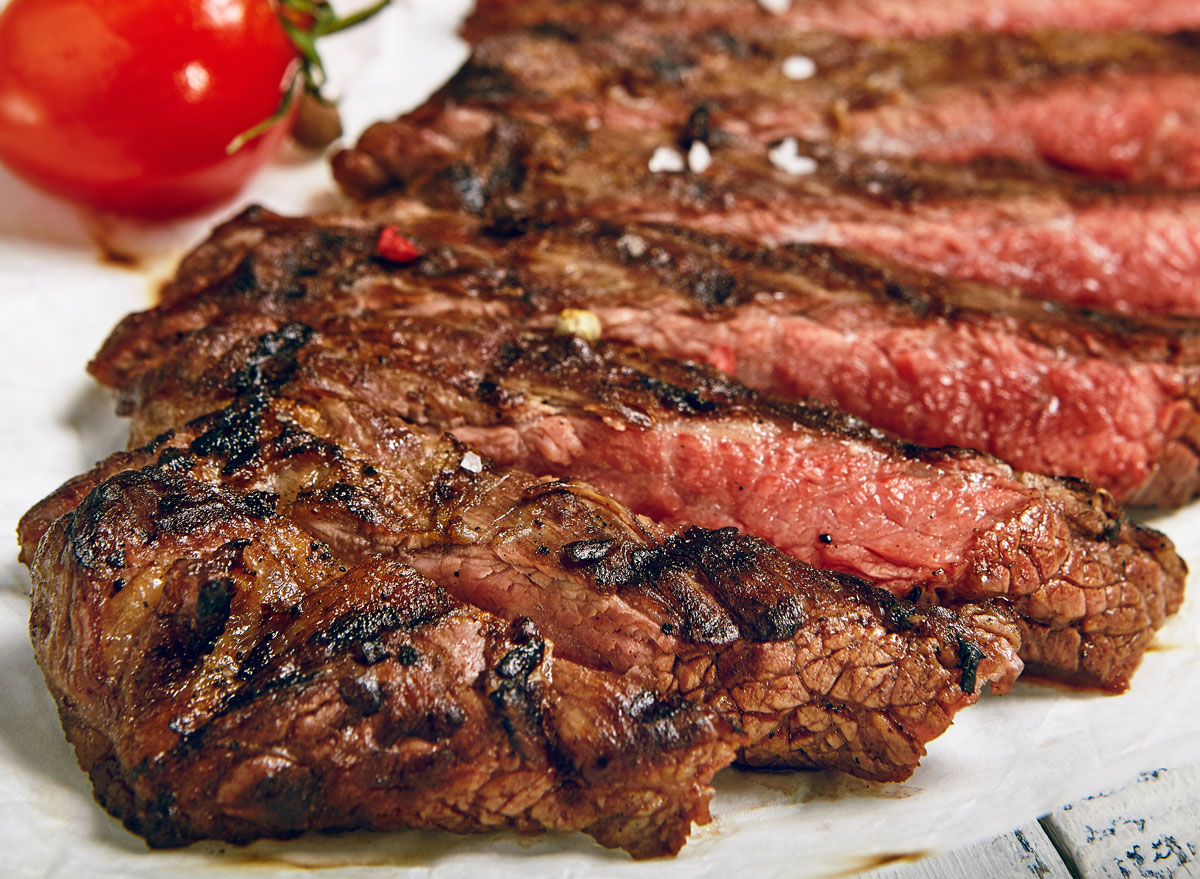
Grass-fed beef has the holy trifecta of muscle building: It’s the #1 food source of creatine, which increases muscle mass by speeding protein to muscles; it’s rich in CLA, an anti-inflammatory fatty acid; and it provides more than one-half the recommended daily intake of protein in a four-ounce serving. “It’s great for you—rich in iron, magnesium, and B12, which you need to have for muscle building,” says Kaufman, who notes that she tells her patients who have a history of high cholesterol not to eat more than two servings of red meat per week.
How to Best Eat It: Use grass-fed beef to make the best-ever burger for weight loss or in any of our delicious steak recipes.
Almonds
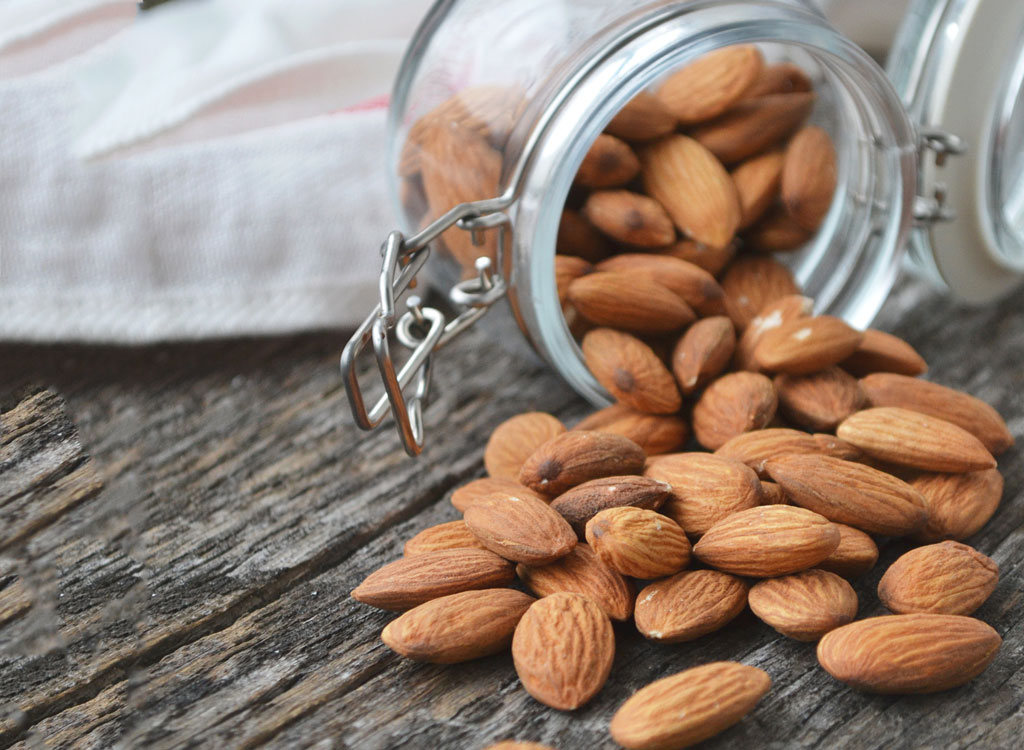
Nature’s magic bullets have been shown to have special fat-burning properties if you consume them before a workout: A study printed in The Journal of the International Society of Sports Nutrition found that the L-arginine in almonds can help you burn more fat and carbs in the gym. When it comes to muscle building, a quarter-cup of raw almonds has eight grams of protein and is high in magnesium, which boosts energy and endurance. “Almonds are great—you just need to watch the quantity,” says Kaufman. “I recommend eating 20 max. If you go over that, your body will be storing fat instead of building muscle.”
How to Best Eat It: Nosh on a handful of almonds with a piece of fruit an hour or so before hitting the gym. The L-arginine in the nuts will amp up your gym session and the glucose in the fruit will provide the energy you need.
Bananas
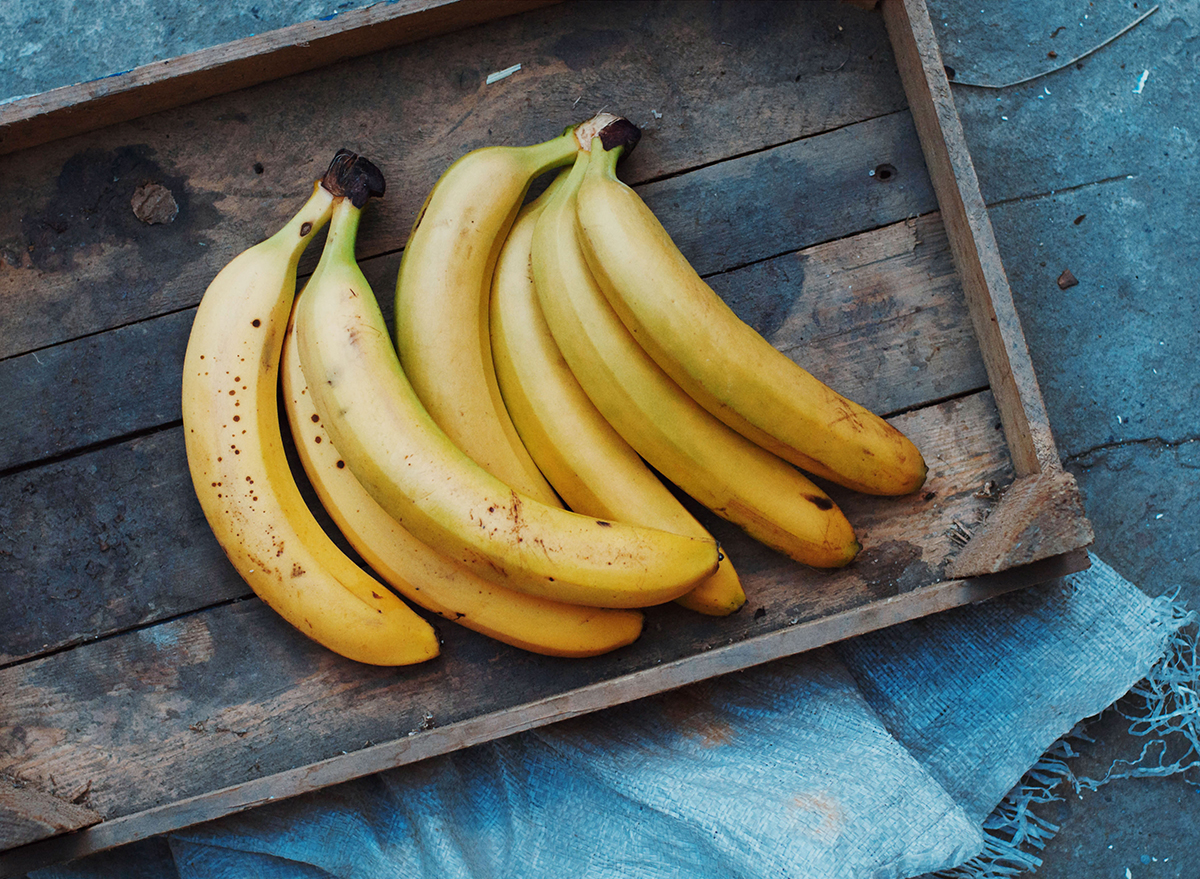
Bananas are an ideal source of fuel. They’re rich in glucose, a highly digestible sugar, which provides quick energy (talk about a great pre-workout snack!) and their high potassium content helps prevent muscle cramping during your lean body workout. Each medium banana contains about 36 grams of good carbs. Plus, their low glycemic index means carbs are slowly released into your body, preventing sugar crashes and spurring the process of muscle recovery.
How to Best Eat It: Throw a ‘nanner into your oats, smoothies, and fruit salads. Alternatively, smear it with nut butter for a filling post-workout snack.